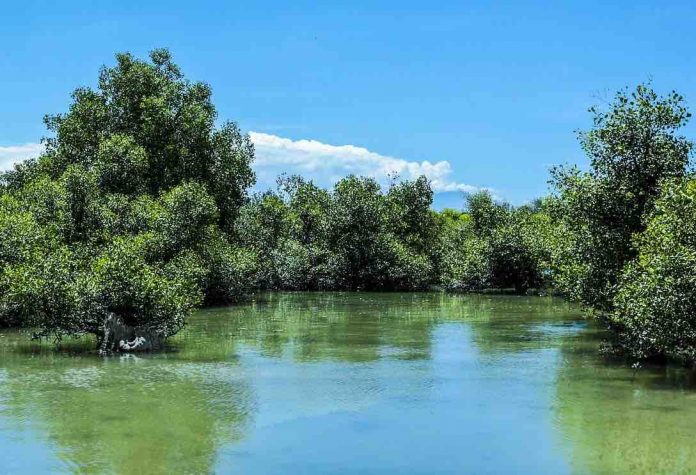A deep dive beneath mangrove sinkholes has found the highest single carbon stocks ever reported, further highlighting the importance of mangroves as carbon sequesters.
Dr Fernanda Adame from Griffith University’s Australian Rivers Institute led the research, published in Biology Letters, in which she and the team sampled mangrove peat soil from three sinkhole sites across Yucatan Peninsula in the south of Mexico.
The sinkholes, or cenotes, are deep pockets of mangrove that can be found inland, in freshwater or along the coastline and the sites studied by Dr Adame and the team were found in water 5-10m deep with carbon layers that ranged from 1-6m.
Dr Adame assessed the soil organic carbon (SOC) stocks, sequestration rate and carbon origin of the three sites, and found SOC stocks of up to 2792 Mg C ha-1, the highest value reported in literature so far.
“To put it into perspective, a tropical forest has about 400 tons of carbon per hectares; the mangroves in these cenotes had 2700 tons,” Dr Adame said.
“The extraordinary amount of carbon in these mangroves is due to their high productivity, but also to the unique sea-level history of the region. Mangroves accumulate carbon when sea level rises slowly.
“We found mangrove roots that were highly preserved since their deposition, which we found to be around 3000 years ago.”
Mangroves are among the most carbon-dense ecosystems on the planet. The capacity of mangroves to store and accumulate carbon has been assessed and reported at regional, national and global scales. However, small-scale sampling such as this study is still revealing ‘hot spots’ of carbon accumulation.
Dr Adame said the carbon stored in the cenote soils should be a priority for conservation, as disturbing it would cause massive emissions.
“Most cenotes are owned by Mayan communities and are threatened by increased tourism and the resulting extraction and pollution of groundwater. These hot spots of carbon sequestration, albeit small in area, require adequate protection and could provide valuable financial opportunities through carbon-offsetting mechanisms and other payments for ecosystem services,” she said.
“Yucatan is threatened by poorly planned tourist developments, which have resulted in mangrove deforestation, groundwater over-extraction, and pollution of the aquifer due to poor sewage management.
“Our hope is that his data will provide information to create carbon projects that will benefit the Mayan communities of the region who own these cenotes.“
The research ‘Mangrove sinkholes (cenotes) of the Yucatan Peninsula, a global hotspot of carbon sequestration has been published’ in Biology Letters.















